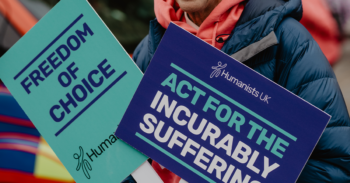
Today the Health and Social Care Committee met with international experts on assisted dying who gave evidence to the ongoing inquiry. The experts were drawn from Australia, New Zealand, and America where assisted dying is legal in some jurisdictions for those with terminal illnesses. Humanists UK supports the inquiry, as a well informed discussion on a change to the law on assisted dying in England and Wales is long overdue, and called for the inquiry to take further evidence from jurisdictions where assisted dying laws are working also for those who are intolerably suffering as well as for the terminally ill.
The committee questioned experts about how the change in law came about and how safeguards are working in their countries. The Hon Kyam Maher MLC, from the Government of South Australia, explained that the 71 safeguards which have been put in place create a much safer environment than before the law was brought in. Professor Brian Owler, a Consultant Neurosurgeon from Sydney, confirmed that evidence given from the Coroner’s Office helped persuade Ministers that harm was happening without a law for assisted dying as people were taking their end of life into their own hands without medical support or their families allowed to be present.
Experts who oppose a change in the law raised concerns about the number of deaths from euthanasia in Canada due to loneliness. However, this is not a valid qualifier for medical assistance in dying (MAID) in Canada where an applicant must have a serious illness, disease, or disability (excluding a mental illness), as covered in Humanists UK’s recent report Canada’s Assisted Dying laws. Professor Roderick MacLeod from New Zealand, who opposes the country’s law, said that people didn’t understand what assisted dying meant when voting in New Zealand’s referendum. He conceded that there is no appetite to turn back the clock in New Zealand but he would like to see more data collected on the process in place.
Kyam Maher MLC made it clear that in Australia the public were very clear on what the law change meant, and Professor Owler said that assisted dying legislation is about understanding people’s autonomy and respecting their choice about timing and manner of death. Both experts from Australia said that there had been a rigorous process to get the right law in place, and that each state had separately passed laws which are very closely aligned.
The committee has already published its initial findings from a public survey on assisted dying, and commented on their fact finding trip to Oregon. The next stage of the inquiry is to hear evidence from more experts, campaigners and from those personally impacted by the current law.
Humanists UK Campaigns Manager Kathy Riddick said:
‘We welcome the Health and Social Care Committee hearing evidence from a range of experts on assisted dying which underlines the need for compassionate reform now.
‘People who are terminally ill or incurably suffering deserve the right to make choices at the end of their lives. We hope that the committee will hear further evidence from countries which have enabled assisted dying for those who are incurable suffering as well as for the terminally ill such as in Spain and Belgium.’
Notes:
For further comment or information, media should contact Humanists UK Campaigns Manager Kathy Riddick at press@humanists.uk or phone 020 7324 3072 or 020 3675 0959.
Read more about a decade of campaigning for the legal right to die – at home and abroad.
Read the ONS study on suicides among people diagnosed with severe health conditions.
Read more about our campaign to legalise assisted dying in the UK.
Humanists UK is the national charity working on behalf of non-religious people. Powered by 100,000 members and supporters, we advance free thinking and promote humanism to create a tolerant society where rational thinking and kindness prevail. We provide ceremonies, pastoral care, education, and support services benefitting over a million people every year and our campaigns advance humanist thinking on ethical issues, human rights, and equal treatment for all.
